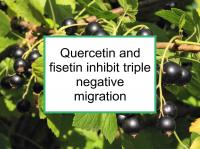Flavonols such as quercetin, kaempferol, fisetin, and myricetin, are pigments found in a wide variety of plants. Diets abundant in flavonols have been linked to reduced breast cancer risk. Now a new study has reported that both quercetin and fisetin can inhibit migration of metastatic triple negative cells.
Impact of quercetin on breast cancer
Quercetin, which is a phytoestrogen, has been shown to induce the death of hormone receptor positive (ER+/PR+), HER2-positive (HER2+) and triple negative (ER-/PR-/HER2-) breast cancer cells, while not harming normal breast cells. Quercetin has also been found to reduce angiogenesis (the growth of new blood vessels) of mammary tumors in a mouse model of breast cancer. In addition, quercetin has been shown to enhance the treatment effects of doxorubicin and paclitaxel in ER+/PR+ breast cancer cells and reverse multidrug resistance, in part by eliminating breast cancer stem cells.
Quercetin is significantly available in the following foods:Note that while consuming flavonol-rich foods has chemopreventive effects, safe and effective dosages of flavonol supplements have not been established. Use of quercetin and fisetin supplements will not necessarily protect against breast cancer and may promote it. One animal study reported that quercetin supplementation worsened breast carcinogenesis. Another study found that supplemental quercetin promoted tumor growth in animal model of brain cancer.
Impact of fisetin on breast cancer
Like quercetin, fisetin is a phytoestrogen which also has been shown to induce the death of ER+/PR+, HER2+ and triple negative breast cancer cells while not harming normal breast cells. One study reported that fisetin inhibited the formation of a carcinogenic compound (4-hydroxy-E2 (4-OHE2)) from estradiol (E2, the most important estrogen). Fisetin was found to reduce ER+/PR+ breast cancer cell invasion in another study.
The following foods are the best sources of fisetin:
- Apples
- Grapes
- Kiwifruit
- Onions
- Persimmons
- Strawberries
Latest research finds quercetin and fisetin can inhibit TN migration
The study referenced above was designed to investigate the effects of fisetin and quercetin on triple negative breast cancer cell migration, invasion, and metastasis. Multiple successful treatments have been developed to eliminate cancer cells and shrink tumors. However, it is typical for treatment-induced adaptations to enable subsets of cancer cells to survive such cytotoxic treatment. As a result, more targeted treatments are needed to prevent metastasis, a multi-step process which includes cancer cell migration and invasion.
The authors used nine triple negative breast cancer cell lines to evaluate the effects of fisetin and quercetin. Both flavonols were found to be highly effective against migration of all nine cell lines, with up to 76% inhibition for fisetin and 74% for quercetin. In addition, the treatments reduced 3D invasion of highly motile triple negative breast cancer cells from spheroids into a collagen matrix and reduced their metastasis in an animal model of breast cancer. Fisetin and quercetin were found to target different parts of the oncogenic PI3K/AKT signaling pathway. Both flavonols also disrupted activities of several protein kinases in MAPK and STAT pathways. The authors used molecular inhibitors specific to these signaling proteins to prove that the flavonols inhibited migration of triple negative breast cancer cells. The authors conclude that fisetin and quercetin inhibit migration of metastatic triple negative breast cancer cells by interfering with activities of protein kinases in multiple oncogenic pathways.
Please see our article on triple negative diet and the quercetin and fisetin tags for more information.
